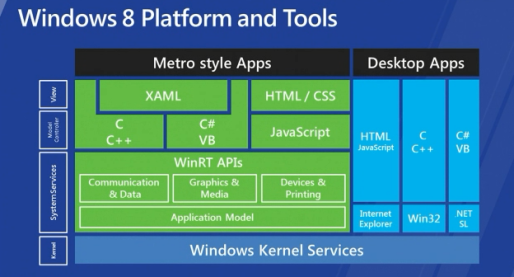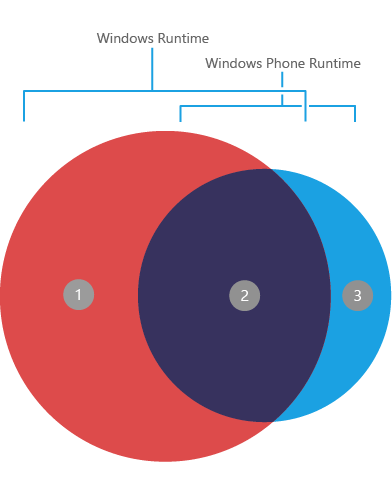| Version 4 (modified by riza, 10 years ago) (diff) |
|---|
Windows Runtime (WinRT) Overview
This document is compiled from various sources in hopes to give better understanding in regards to WinRT and specifically its relation to Windows RT and Windows Phone.
Windows Runtime
Windows Runtime, or shortly WinRT, is Microsoft’s new programming model that makes the backbone of the new Metro-style apps. It is designed in hopes to solve many of the problems of Win32, from an apps perspective. Apps created for WinRT are safe, secure, and sandboxed, can’t wreck other apps and all install in just 2-3 seconds. They feature isolated storage, single folder installs (as per the Mac), and require user consent to access the general file system.
WinRT isn’t another abstraction layer; it’s a new runtime sitting directly on top of the Windows Kernel Services just like the good old Win32 API as shown in the above figure. WinRT APIs includes a subset of traditional Win32, Component Object Model (COM), and .NET Framework APIs, as well as HTML5 and CSS3 APIs that are accessible to Metro style app developers.
Windows RT
Windows RT is another member of Windows family, previously known as Windows on ARM (WOA). Software for Windows RT can be either downloaded from Windows Store or sideloaded, although sideloading on Windows RT must first be enabled by purchasing additional licenses through Microsoft volume licensing outlet. Desktop software that run on previous versions of Windows cannot be run on Windows RT as Windows Store apps are based on Windows Runtime (WinRT) API which differs from the traditional apps.
Although it's not confirmed, some said that "RT" stands for Runtime which might be the source of confusion in regards to Windows Runtime API. To make things less confusing between Windows RT and Windows Runtime (API), we’ll just call Windows Runtime API as WinRT.
Windows Phone Runtime
Windows Phone Runtime(WPRT) is a subset of native API that is built into the operating system.
The diagram has three distinct areas and these are described as follows:
- The set of WinRT API not supported on WPRT.
- The set of WinRT API adopted for WPRT API. This is represented by area 2 in the above diagram and consists of approximately 2,800 members. There might be some differences (types) which is noted in the API reference documentation.
- The set of API adopted for WPRT are represented by area 3 in the diagram. These APIs use the WinRT style APIs, meaning you can use them regardless of the programming language you use for your app.
These are some features that are not available on WinRT API
- Clipboard APIs
- Lock screen background provider
- Ringtone provider
- Alarms and reminders
- Lens apps
- Photos extensibility
- VoIP apps
- Search Extras
- XNA SoundEffect API
- Generating bitmaps for Live Tiles in a Background Task using managed code
Windows Phone 8
It is the second generation of the Windows Phone mobile operating system from Microsoft. WP8 can run app build based on WPRT API.
Windows Phone 8.1
It is the update to WP8 and support app build based on WinRT API, thus developers are given the choice of using WinRT API or WPRT API. Existing app from WP8 (using WPRT) can reuse their code by upgrading their app to Windows phone silverlight 8.1 app.
Reference:
Attachments (2)
- WinRT.png (121.0 KB) - added by riza 10 years ago.
- WPRT.png (15.7 KB) - added by riza 10 years ago.
Download all attachments as: .zip
![(please configure the [header_logo] section in trac.ini)](/repos/chrome/site/pj.jpg)

